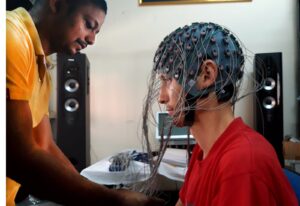 July, 1st 2025, Mandi: In a landmark fusion of India’s rich musical heritage and cutting-edge neuroscience, a new and recent study led by Prof. Laxmidhar Behera, Director of IIT Mandi, has offered compelling scientific validation for a long-held cultural belief that music can transform the mind, exploring the dynamics of brain microtubules. Published in Frontiers in Human Neuroscience, the study reveals that listening to Indian Classical Ragas can significantly influence brain activity, enhancing attention, emotional regulation, and mental stability. Conducted in collaboration with IIT Kanpur on 40 participants, the research employed advanced EEG microstate analysis, a real-time brain-mapping technique that captures momentary but meaningful patterns of neural activity. These “microstates,” often lasting just tens of milliseconds, represent the brain’s transient modes of operation such as attention, emotional engagement, or mind-wandering.
July, 1st 2025, Mandi: In a landmark fusion of India’s rich musical heritage and cutting-edge neuroscience, a new and recent study led by Prof. Laxmidhar Behera, Director of IIT Mandi, has offered compelling scientific validation for a long-held cultural belief that music can transform the mind, exploring the dynamics of brain microtubules. Published in Frontiers in Human Neuroscience, the study reveals that listening to Indian Classical Ragas can significantly influence brain activity, enhancing attention, emotional regulation, and mental stability. Conducted in collaboration with IIT Kanpur on 40 participants, the research employed advanced EEG microstate analysis, a real-time brain-mapping technique that captures momentary but meaningful patterns of neural activity. These “microstates,” often lasting just tens of milliseconds, represent the brain’s transient modes of operation such as attention, emotional engagement, or mind-wandering.
What makes this study exceptional is the measurable impact of specific Ragas on these brain states. Raga Darbari, known for its soothing and uplifting qualities, was found to increase attention-related microstates while reducing those associated with mind-wandering, indicating deeper focus and cognitive clarity. In contrast, Raga Jogiya, a melancholic melody, not only enhanced attentional networks but also activated emotion-regulation microstates, enabling listeners to process emotions with calm and composure. “EEG microstates offer a window into how the brain operates moment by moment,” explained Prof. Behera. “It is remarkable to see how these ancient melodies consistently guide the brain into more stable and focused patterns.” Ashish Gupta, the first author of the study, emphasized that the shifts observed in neural activity were not random. “The data showed repeatable, consistent transitions after exposure to the Ragas, suggesting Indian Classical music can serve as a powerful tool for mental wellness,” he said.
With mental health challenges such as stress, burnout, and attention deficits on the rise, this research points to a culturally resonant, non-invasive alternative. The research team suggests that listening to Raga Darbari before exams or important meetings may improve focus, while Raga Jogiya could help manage emotional overwhelm or grief. The study doesn’t just underscore how people feel in response to music, it demonstrates how the brain structurally responds, offering new potential for music-based interventions in cognitive and emotional health. Professor Braj Bhushan of IIT Kanpur, co-author of the study, remarked, “This work reveals the remarkable capacity of Indian Classical music to engage cognitive and emotional systems. It opens a new path for developing personalized, music-based mental health support tools rooted in India’s cultural wisdom.”
In a further affirmation of the findings, the research team conducted a parallel study on Western participants, which confirmed similar effects of classical music on brain microstates. This cross-cultural consistency highlights the universal neurological power of classical music. Both studies, co-authored by Dr. Ashish Gupta, Mr. Chandan Kumar Srivastava, Prof. Braj Bhushan, and Prof. Laxmidhar Behera, have been published in Frontiers in Human Neuroscience. In doing so, they contribute not only to the scientific understanding of music’s influence on the brain, but also to a growing movement that harmonizes ancient traditions with modern science reminding us that the future of mental well-being may well lie in the timeless strains of the past.


